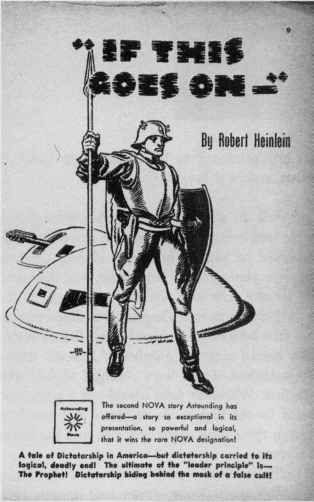Grumbles from the Grave (3 page)
Read Grumbles from the Grave Online
Authors: Robert A. Heinlein,Virginia Heinlein
Tags: #Authors; American - 20th century - Correspondence, #Correspondence, #Literary Collections, #Letters, #Heinlein; Robert A - Correspondence, #Science Fiction & Fantasy, #20th century, #Authors; American, #General, #Language Arts & Disciplines, #Science Fiction, #American, #Literary Criticism, #Science fiction - Authorship, #Biography & Autobiography, #Authorship

At twenty-seven years of age, he found himself permanently ashore, with a small pension. It was necessary for him to find some way to augment that money. He tried silver mining, politics, selling real estate, and further study in engineering. One day, he found an ad in a science fiction magazine for a contest. So he sat down and wrote a story ("Life-Line"). He felt it was too good for the magazine he had written it for, so he sent it to the top magazine in the field—
Astounding Science Fiction.
John W. Campbell, Jr. bought the story.
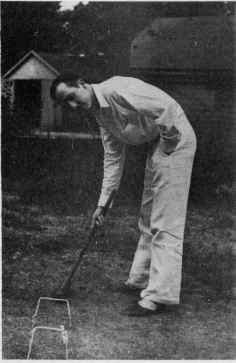
(xiv)
Heinlein gets the ball rolling, 1934.
The next several stories he wrote were less salable, and it was only on his fifth or sixth try that Campbell again purchased one. The second and following stories eventually sold, but Robert was hooked for life on writing. Originally, his purpose in writing was to pay off a mortgage on a house which he and his wife of a few years had purchased. After that mortgage was paid off, he found that when he tried to give up writing, he felt vaguely uncomfortable, and it was only when he returned to his typewriter that he felt fulfilled.
* * *
During World War II, Robert left his writing to do engineering work for the U.S. Navy. For three years he did such work in Philadelphia. The war over, he returned to his writing. By this time, he was looking for wider horizons. He was persuaded to begin the juvenile line, and he sold stories to the
Saturday Evening Post.
His second juvenile was picked up by television, in a series that ran for five years. He also wrote the classic film,
Destination Moon,
and he began to think about writing serious adult novels to open up that market to science fiction.
Robert thought that the possibilities of mankind going into space were sufficiently important and feasible that before he left Philadelphia, he wrote two letters urging that the Navy begin space exploration. One letter went through channels as far as the head of the Philadelphia Naval Air Experimental Station, who killed the proposal. The second went (also through channels), via a friend, through Naval Operations, and got as far as a Cabinet meeting. It was reported that then-President Truman took it seriously enough to ask whether such a rocket could be launched from the deck of a ship. No, the President was told. And that killed the project.
In 1947 Robert was divorced from his wife, and when he received his decree nisi, he married me. During World War II, I had gone into the Navy, as a WAVE, and my second tour of duty was in Philadelphia, where I met Robert; we worked in the same section.
One day Robert spent hours searching for some tear sheets for an anthology. In an effort to help, I decided that his files needed to be organized. So I set about that, setting up a system which I still use today. This began my involvement in the literary business.
By the time Robert found himself too busy to do more than overhead work (keeping up correspondence with his agents, keeping records, answering fan mail, and all the other chores attendant on being a literary figure), I was well enough acquainted with his business that I could take over those chores for him. We worked together as a team, discussing what to do about offers, and I would answer the letters for him.
* * *
With the juvenile series well launched, and selling many copies primarily to libraries, Robert became the darling of librarians. He was asked to give endless speeches, and when his annual books for boys came out, he did a special program for general radio distribution on each new book.
But he still yearned to do serious writing for adults, rather than for the specialized science fiction market. So, in 1960, he finished writing
Stranger in a Strange Land.
That book became his best known work. When the boys who originally read his juveniles grew up, they kept looking for more of the science fiction which Robert had made so popular. So he set out to write adult novels for them. For some years, he regularly wrote two books a year, one adult and one juvenile. In addition, there were always requests for other things in the way of nonfiction. Many of those requests had to be turned down for lack of time.
Between books, we did a good deal of foreign travel. We went around the world four times, spent time in Europe. One of the most interesting, but not to be repeated trips, was to the Soviet Union. In 1960, we saw the May Day parade, then took off for Kazakhstan. Soon after our arrival in Alma-Ata, we were told of the U-2 incident. Things turned frosty for us, but there was no way out, so we continued the trip, going on to Samarkand, which was the real reason we went all that way into the USSR. While we were in Vilno, just before a summit conference between Khrushchev and President Eisenhower, the Soviet Union sent up a rocket which to this day we cannot be certain was unmanned. On the way down from seeing some castle in Vilno, we encountered a group of Red Army cadets, who were extremely excited about it and had to tell us. We were heartsick about the development and returned to our hotel.
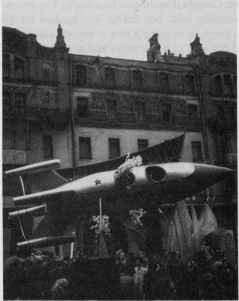
(xvi)
The Soviet Union's May Day Rocket, 1960. The slogan reads "Earth-Mars-Earth—we will get there first."
* * *
In 1970, there was a serious illness, from which it took him two years to recover his health. Then, he sat down at his typewriter and turned out
Time Enough for Love.
Always a man of fragile health, illnesses became more frequent, and there was less time for writing. We both had a taste for travel, and we saw a good deal of the world; anywhere there was transportation, we went. We visited Antarctica and went through the Northwest Passage to Japan. When China opened up to travel, we went there, among other parts of the East.
To Sail Beyond the Sunset
was eventually published on Robert's 80th birthday. Questions began to come in—Was this to be the final book from his typewriter? (But by this time it was a computer.) He had intended to write more, but again illness intervened, and
To Sail did
become his final story.
* * *
I will leave it to others to evaluate the influence of Robert's work, but I have been told many times that he was the "Father of Modern Science Fiction." Those books have been published in many languages, in many lands, and some of them seem to have been landmark stories.
During his lifetime, Robert received many honors, including four Hugo awards for the best novel of the year. The books so honored were:
Double Star
(1956),
Starship Troopers
(1959),
Stranger in a Strange Land
(1962), and
The Moon Is a Harsh Mistress
(1966). He was also the recipient of the first Grand Master Nebula Award from the Science Fiction Writers of America. There were also many other awards: The Sequoyah Award, given by the Children of Oklahoma for the best children's novel of the year
(Have SpaceSuit—Will Travel)
; many awards for the blood drives we did;
Tomorrow Starts Here
, given by Delta Vee, Inc.; Robert perennially won first rank among popular writers in the
Locus
inquiries. But the thing which pleased him most, it seemed, was being invited to be a Forrestal Lecturer at his alma mater in 1972.
In October 1988, I was asked to come to Washington, D.C., to receive, on Robert's behalf, the Distinguished Public Service Medal. My greatest regret is that he could not have known of that.
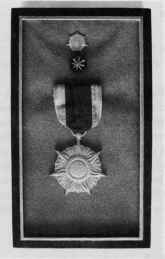
(xviii)
Heinlein's Distinguished Public Service Medal (awarded posthumously). [from the personal archives of Virginia Heinlein]
CHAPTER I
IN THE BEGINNING
April 10, 1939: Robert A. Heinlein to John W. Campbell, Jr.
I am submitting the enclosed short story "Life-Line" for either
Astounding
or
Unknown,
because I am not sure which policy it fits the better.
Editor's Note: Robert always told the following story when asked how he began writing. He had seen an ad in one of the pulp science fiction magazines, offering $50.00 for the best story by a beginning writer. He wrote "Life-Line," then decided that it was too good for that particular magazine. So he sent it to John W. Campbell, Jr., who had been editing
Astounding
for approximately two years at that time. Campbell was always looking for new talent and apparently recognized it in Robert's first work. Robert claimed that he took a look at the check for "Life-Line" and said, "How long has this racket been going on?" His second story was also accepted, after some revisions. Thereafter it was some months before Campbell accepted another story.
Robert was one of a group of writers whose work is new called "The Golden Age of Science Fiction." John Campbell helped his writers along with suggestions and brought them along to make
Astounding
the foremost science fiction pulp magazine of the time.
April 19, 1939: John W. Campbell, Jr. to Robert A. Heinlein
. . . I like your story, "Life-Line," and plan to take it at our regular rate of 1 cent a word, or $70.00 for your manuscript.
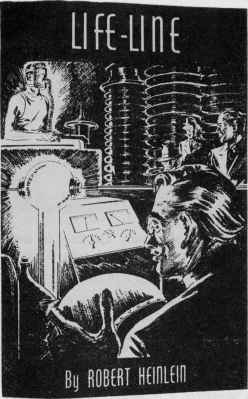
(4)
Heinlein's first story, "Life-Line," John W. Campell, Jr.'s
Astounding
, August 1939. Art by Isip.
August 25, 1939: John W. Campbell, Jr. to Robert A. Heinlein
At about this time you should receive our check for $310.00 for "—Vine and Fig Tree—" ("If This Goes On—")—which title will have to be changed to give it more umph. The story, by practically all that's good and holy, deserves our usual unusually-good-story 25% bonus. It's a corking good yarn; may you send us many more as capably handled.
But—for the love of Heaven—
don't
send us any more on the theme of this one. The bonus misfires because this yarn is going to be a headache and a shaker-in-the-boots; it's going to take a lot of careful rewording and shifting of emphasis.
